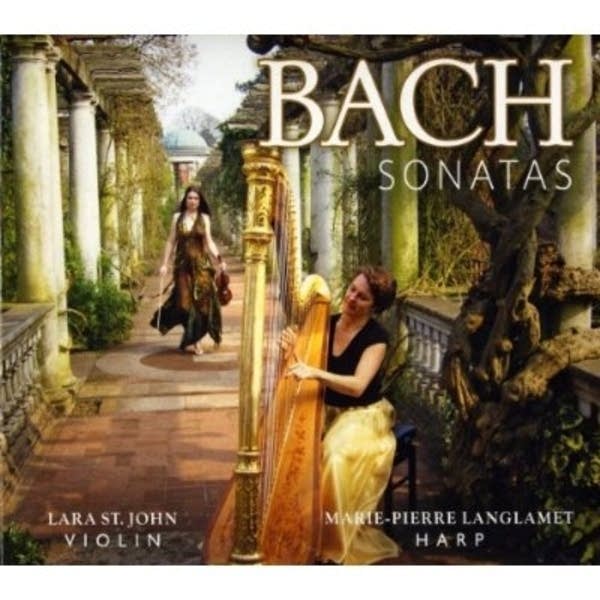
A new Bach disc combines violin with an instrument that Bach himself rarely used — the harp. Its gradations of loud and soft add a new dimension to the performance of these pieces.
In the Baroque era it was common for composers like J.S. Bach and Handel to draft new arrangements of their own works. Their music is also easily adaptable to other instruments, resulting in many re-imagined performances over the years. On her latest recording, Canadian violinist Lara St. John and Marie-Pierre Langlamet, principal harpist of the Berlin Philharmonic, refresh a collection of Bach sonatas originally intended for violin or flute and harpsichord.
Lara St. John is one of today's most versatile violinists. She's a champion of new music, she's recorded jazz, and she has her own polka band. Her new recording marks the third time she's recorded the music of Bach. She's had a lifelong relationship with the instrumental music of her favorite Baroque composer. This time she unexpectedly found herself exploring Bach's sonatas for violin and harpsichord while visiting Marie-Pierre Langlamet, whom she's known since their days at the Curtis Institute in Philadelphia.
"We used to do some really weird things back in the Curtis days," St. John explains. "Marie-Pierre is an amazing sightreader on the harp. We would read through things like (Bach's) B minor mass with a couple other friends. Over many years we've kept in touch and I was in Berlin a little while ago and Marie-Pierre said, Oh let's read some stuff! She brought out the Bach sonatas for violin and harpsichord. And it was pretty cool because I'd never heard them with harp before. It was kind of revelatory to me that finally here's how they, at least in my opinion, should sound!"
Lara St. John was never attracted to these sonatas because she felt the harpsichord was too limited in its ability to add nuance and dynamics. When she heard them played with the harp, she was captivated by their beauty, "And as Marie-Pierre was telling me yesterday," St. John adds, "Bach's favorite instrument was in fact the clavichord, which unlike the harpsichord actually did have some sort of dynamic possibility. So we think that doing them with the pedal harp is probably not that far off from what he would have wanted." It's easy for the violin to overpower the harp, so Lara St. John says she quickly learned a thing or two about being a sensitive musical partner: "I did have to learn to restrain a little bit and start diminuendos a bit earlier. Not only do I want to hear her, but I want everyone else to be able to hear her as well. What she does with these nuances is amazing, so why would I want to cover that up?"
The harp is an impressionistic instrument, explains Marie-Pierre, with the ability to be very evocative, especially in the slow movements of these sonatas, "The harp is a very intimate instrument and one problem of the harp — if you start playing too loud it becomes very percussive. So, all the range of expression I'm looking for is much easier in the soft dynamics." It's the Sonata No. 3 that both Marie-Pierre and Lara are most enthused about playing. Marie-Pierre starts to explain:"For example just the first movement is just this incredibly long line, just this quest for—," when Lara adds, "Oh, the E Major, yeah, it's an incredible movement and the other slow movement is just amazing."
Marie-Pierre: "And this is like written for harp, actually, with this arpeggio beginning."
Lara: "With the E major violin sonata it's almost like he really had the harp in mind. Like he was ahead of himself."
Most would agree Bach probably was ahead himself, which is one reason his music has withstood the test of time. He would probably also approve of this new recording which illuminates his sonatas in a refreshing new light.
Love the music?
Show your support by making a gift to YourClassical.
Each day, we’re here for you with thoughtful streams that set the tone for your day – not to mention the stories and programs that inspire you to new discovery and help you explore the music you love.
YourClassical is available for free, because we are listener-supported public media. Take a moment to make your gift today.
Your Donation
About New Classical Tracks®
Host Julie Amacher provides an in-depth exploration of a new classical music release each week.
Subscribe on Apple Podcasts, Spotify, Radio Public, or RSS.












